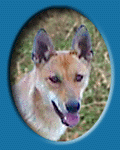Banbury Cross Farm
Carolina Dogs / American Dingos

"You're one of the very few who have actually preserved the breed and cared about them remaining true. We need more of that, and need to support those who do it right." -Raluca
CAROLINA DOG
America's 'all-natural' dog Nicknamed the "American Dingo," the
"Dixie Dingo," the "Native American Dog," and the "OF Yaller dog"
in the rural South, the Carolina Dog, as it's properly known, hails
from the swamps and bottomlands of South Carolina and Georgia.
But Jane Gunnell, president of The Carolina Dog Association, says
the dog's ancestry reaches to the other side of the globe.
"We've traced the Carolina Dog back to other primitive breeds,
like the Australian Dingo," says Gunnell, who along with ecologist
I. Lehr Brisbin, Jr., has been instrumental in gathering, identifying,
preserving, and raising the dogs in a captive-breeding program at
her Mane Chance Kennels at Banbury Cross Farm outside Aiken,
Ga. Pockets of these free-ranging feral dogs have thrived for
centuries in remote cypress swamps and forests of the
rural South. Historians believe the dogs, who originated
in southwest Asia, crossed the Bering Land Bridge into
North America with the first humans tens of thousands
of years ago. They made their way down the continent
and into the Southwest, where archaeological evidence
placed them among the Native American basket-making
cultures. Later, they traveled east and settled with the
native people of the Southeast woodlands now known
as the Carolinas.
"They closely resemble types of dogs first encountered
by Europeans near Indian settlements in the region as is
evidenced by paintings, drawings, and written
descriptions made by these early explorers and settlers," writes Gunnell on the CDA website. Only in the past 30 years have these dogs gained dog fanciers' attention. They're currently recognized by the United Kennel Club and American Rare Breed Association, and the CDA is working with the American Kennel Club for inclusion in their registry, too. "These are nature's dogs," Gunnell says. "They haven't been crossed by man. They haven't been bred for a particular purpose, like a hunting dog or a working dog. Mentally and physically, they're the way dogs should be."A renaissance dog Though the Carolina Dog has no prescribed "purpose," the brilliant breed excels at virtually every activity or sport it tries, says Jackie Lancaster, a longtime Carolina Dog owner and award-winning handler and trainer in Walls, Miss. Her champion Banbury Cross Glory Be, or "Star," has earned dual conformation championships (UKC and ARBA), obedience titles, agility titles, herding titles, Canine Good Citizen certification, and Temperament Test certification. Gunnell, Star's breeder, adds that other pups have gone on to become searchand- rescue dogs and therapy dogs. "They're extremely intelligent and have excelled in many venues," says Lancaster. who currently owns five Carolina Dogs — all of whom are champions. "And they're wonderful bouse dogs, too. They're very clean, almost cat-like. They're incredibly trainable. And if they ever had to sleep outside, they'd never speak to us again." Special handling required Because the Carolina Dog retains some innate feral behaviors, Gunnell says they require tremendous amounts of socialization at a very young age to get accustomed to life with humans.
"It takes a lot of devotion and a lot of love and treats, but they'll come right around." Gunnell says. "And once they do, they never go back to the wild. Once they've been properly socialized, they are your loyal friend for life."
Country of origin: United States.
Original use: Hunting.
Group: Sighthound & Pariah (UKC).
Average life span: 12 to 14 years.
Color: Deep red ginger with pale buff markings over shoulders and along muzzle preferred; variations, grading from straw-colored through pale yellow buff, are also accepted, as is dark sabling over back, loins, and tail.
Coat: Double coat varies by seasons, winter coat distinctly heavier than summer coat; overall short and smooth with coarse, longer guard hair over neck, withers, and back that stands up
when alerted.
Grooming: Seasonal shedding controlled with regular brushing. Bathe when necessary; brush teeth, check eyes and ears for signs of infection, and clip nails regularly.
Height/weight: 17X to 191 inches, 30 to 44 pounds.
Personality: Highly intelligent, loyal, amiable, lives to please owners.
Trainability: High; responds best to positive training techniques.
Activity level: Moderate; will be as active as owners.
Known health problems: Generally healthy; check ears regularly for signs of infection.
Good with children? Yes, with appropriate supervision.
Good with other pets? Yes, with appropriate supervision.
National breed club: The Carolina Dog Association,
Jane Gunnell, president,
262 Eastgate Dr. #342, Aiken, SC
29803; 803-215-6164;
www.carolinadogs.org;
janefoxandhound@gmail.com
Rescue: Contact The Carolina Dog Association.
More info: DogChannel.com/carolinadog
DogFancy, December 2010


